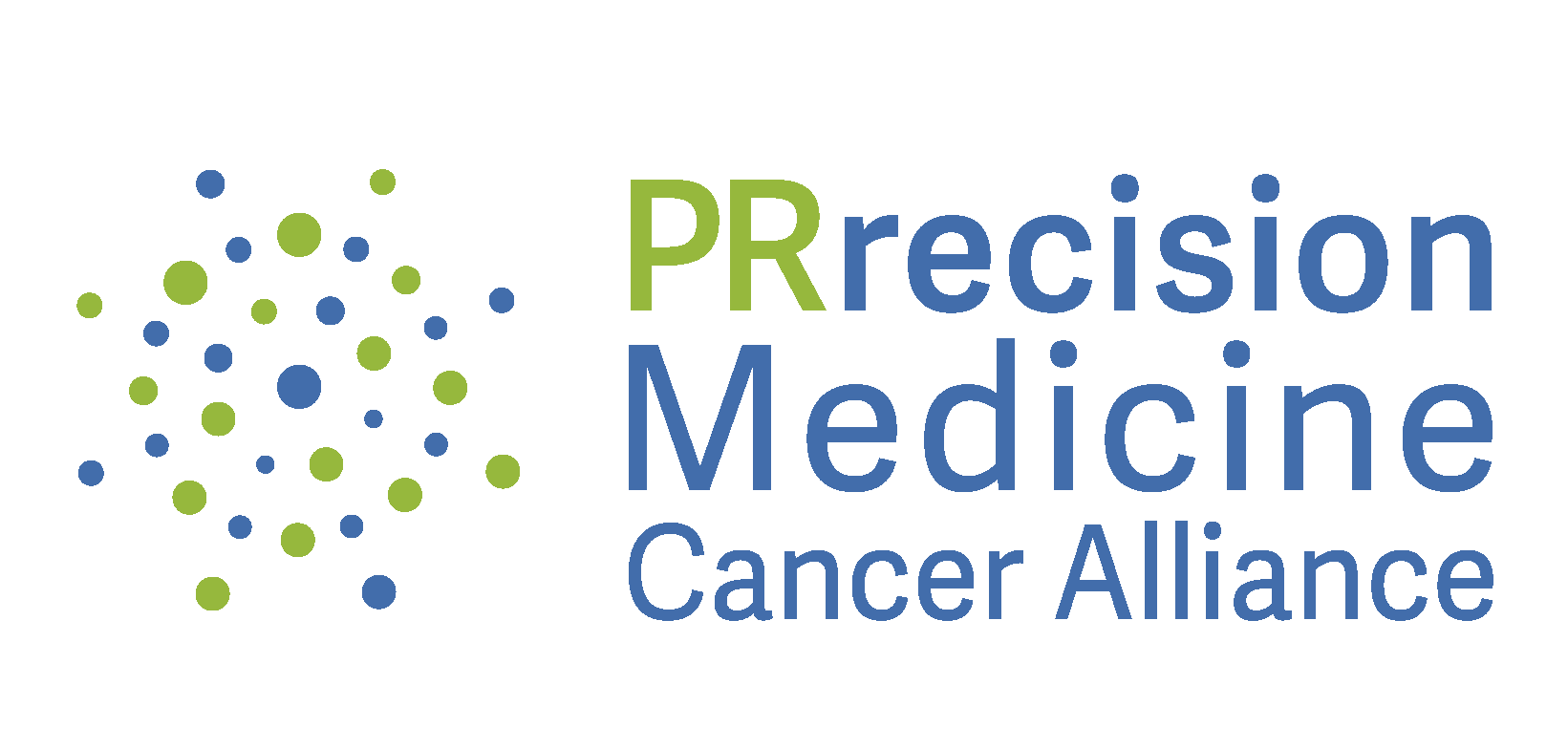
WHO ARE WE?
We are a multi-sectoral alliance to bring full access to comprehensive molecular testing by offering Next-generation Seguencing (NGS) testing availabilit to the Puerto Rico medical communit who are directly involved in most areas of the oncology patient’s journey.
The alliance will provide awareness and most importantly access to NGS testing across all tumors and promote important referrals of patients to target physicians prior and after surgery and/or biopsy. One of the goals of this initiative is to create a call to action to healthcare providers to increase demand of NGS testing allowing the selection of targeted treatment opportunities earlier.
RATIONAL
As defined bv the Nationa Cancer Institute. “Targeted cancer therapies are drugs or other substances that block the growth and spread of cancer by interfering with specific molecules (“molecular targets”) that are involved in the growth, progression, and spread of cancer. Targeted cancer therapies are sometimes called “molecularly targeted drugs,” “molecularly targeted therapies,” “precision medicines,” or similar names.
Targeted therapies are currently the focus of much anticancer drug development. They are cornerstone of precision medicine, a form of medicine that uses Information about a person’s genes and proteins to prevent, diagnose, and treat disease. There are several different molecular testing technologies available in the market. however targeted Next-generation Seguencing (NGS) provides the advantage to include a large- scale DNA/RNA sequencing of the entire human genome to enable rapid identitication of common and rare genetic variation. These tests can be performed to identify specific alterations that may drive the behavior of cancer. This information may help physicians optimize a course of treatment based on the patient’s unique cancer.
Some of the major known challenges to NGS testing in Puerto Rico are:
- Access and /or managed care organization authorizations
- Availabilitv, guality, and turnaround time
- Lack of standardization in NGS techniques
- General limited nearncare awareness
- Annual conference for physicians and HCP
OBJECTIVES

Some of the major known barriers to NGS testing are:
-
- Cost. Access and/or managed care organization approvals
- Avallability, Quality, and turnaround time of NGS testing
- General lack of awareness

The alliance will provide awareness and access to NGS testing across tumors, and promote important referrals of patients to target physicians prior and after surgery


Create a databank for most incidence/
prevalence of molecular abnormalities among oncology patient population in Puerto Rico based on real world evidence
References
- Pavlidis N, Pentheroudakis G.. Cancer of unknown primary site. Lancet. 2012;379(9824):1428-1435.
- Siegel RL, Miller KD, Fuchs HE, Jemal A.. Cancer statistics, 2021. CA Cancer J Clin. 2021;71(1):7-33.
- National Comprehensive Cancer Network. N.C.C.N. Guidelines. Occult primary. Version 2.2021.
- Golfinopoulos V, Pentheroudakis G, Salanti G, Nearchou AD, Ioannidis JP, Pavlidis N.. Comparative survival with diverse chemotherapy regimens for cancer of unknown primary site: multiple-treatments meta-analysis. Cancer Treat Rev. 2009;35(7):570-573.
- Fizazi K, Greco FA, Pavlidis N, Daugaard G, Oien K, Pentheroudakis G; ESMO Guidelines Committee . Cancers of unknown primary site: ESMO Clinical Practice Guidelines for diagnosis, treatment and follow-up. Ann Oncol. 2015;26 Suppl 5:v133-v138.
- Petrakis D, Pentheroudakis G, Voulgaris E, Pavlidis N.. Prognostication in cancer of unknown primary (CUP): development of a prognostic algorithm in 311 cases and review of the literature. Cancer Treat Rev. 2013;39(7):701-708.
- U.S. Food and Drug Administration (FDA). Oncology (cancer)/hematologic malignancies approval notifications. Accessed July 1, 2021. https://www.Fda.Gov/drugs/resources-information-approved-drugs/oncology-cancer-hematologic-malignancies-approval-notifications.
- Vela CM, Knepper TC, Gillis NK, Walko CM, McLeod HL, Hicks JK.. Quantitation of targetable somatic mutations among patients evaluated by a personalized medicine clinical service: considerations for off-label drug use. Pharmacotherapy. 2017;37(9):1043-1051.
- Zhao P, Peng L, Wu W, et al.. Carcinoma of unknown primary with EML4-ALK fusion response to ALK inhibitors. The Oncologist. 2019;24(4):449-454.
- Genentech. Rozyltrek (entrectinib). U.S. Food and drug administration website. Accessed October 19
- Loxo oncology. Vitrakvi (larotrectinib). U.S. Food and drug administration website. Accessed October 19, 2020.https://www.accessdata.fda.gov/drugsatfda_docs/nda/2018/210861Orig1s000_211710Orig1s000MultidisciplineR.pdf.
- Merck co. Keytruda (pembrolizumab). U.S. Food and drug administration website. Accessed October 19, 2020. https://www.accessdata.fda.gov/drugsatfda_docs/label/2019/125514Orig1s054lbl.pdf.
- Mosele F, Remon J, Mateo J, et al.. Recommendations for the use of next-generation sequencing (NGS) for patients with metastatic cancers: a report from the ESMO Precision Medicine Working Group. Ann Oncol. 2020;31(11):1491-1505.
- Knepper TC, Bell GC, Hicks JK, et al.. Key lessons learned from Moffitt\’s molecular tumor board: the clinical genomics action committee experience. The Oncologist. 2017;22(2):144-151.
- Frampton GM, Fichtenholtz A, Otto GA, et al.. Development and validation of a clinical cancer genomic profiling test based on massively parallel DNA sequencing. Nat Biotechnol. 2013;31(11):1023-1031.
- Ashworth A, Hudson TJ. Genomics: Comparisons across cancers. Nature, 502: 306-307, 2013.
- Cancer Genome Atlas, N. Comprehensive molecular characterization of human colon and rectal cancer. Nature, 487: 330-337, 2012.
- Cancer Genome Atlas, N. Comprehensive molecular portraits of human breast tumours. Nature, 490: 61-70, 2012.
- Kwapisz D. The first liquid biopsy test approved. Is it a new era of mutation testing for non-small cell lung cancer? Ann Transl Med. 2017;5:46.
Our Alliance Partners










